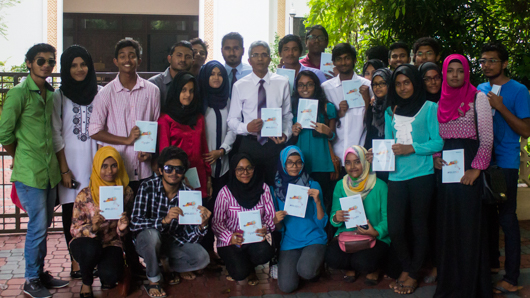Democracy House Maldives has launched its ‘#policy22’ campaign, highlighting the importance of youth participation in decision-making at the policy level.
The campaign – given its name in relation to the percentage of the Maldivian population classed as youth – seeks to create a platform where the youth’s concerns can be heard and acted upon by decision makers.
The youth-led NGO released a report titled ‘Youth Voices’ on December 25, with members of the youth community presenting the report to MPs outside the Majlis, and taking ‘selfies’ with those in support of the campaign.
Democracy House’s Dhumya Mohamed explained that the booklet contained concerns put forward by the youth through a number of consultations as well as including information from several reports on Maldivian youth.
“Over 40 individuals attended the last consultation. The most pressing issue brought forward by the youth was lack of opportunities to participate in policy level decision making,” said Dhumya.
The report notes that there is currently no culture of consultation with the youth despite making up such a significant proportion of the population. The report requests parliamentarians to get youth opinion during the legislative process and to ensure the freedom of expression guaranteed by the constitution.
Published last month, the booklet highlights additional problems brought forward during the consultations such as unemployment and the exploitation of youth in politics.
Youth unemployment
In the report, Democracy House expressed concern at the high youth unemployment rate, noting that there is little awareness and no proper enforcement of the Employment Act.
Suggestions to tackle the high rate of unemployment include utilising youth centers for youth leadership and capacity building programmes, and encouraging young entrepreneurs.
While speaking to Minivan News, Minister of Youth and Sports Mohamed Maleeh Jamal said that the government’s aim is to reduce unemployment to three or four percent in the next five years.
Maleeh pointed out that a youth unemployment register has been created and that there are 13,000 registered individuals within the system.
“We provide the database for organisations who are seeking recruits. However, we have received complaints of individuals not reporting to interviews, work, and also of quitting work within weeks,” said Maleeh.
Maleeh speculated that a significant percentage of youth unemployment is voluntary while stating that the government is running awareness campaigns and career guidance to increase the motivation of young people.
The #policy22 booklet noted a “disconnect” between the current school curriculum and life skills noting that many were “not able to handle adult responsibilities after we leave school.”
Democracy House states youth unemployment to be as high as 43 percent, though the International Labor Organization (ILO) estimates the figure to be at 30 percent. The current government has pledged to create 94,000 jobs during its term.
One request mentioned in the #policy22 booklet appears to be being addressed by the government, with President Abdulla Yameen launching the ‘Get Set – Maldives Youth Entrepreneurship Program’ last month. The scheme aims to provide MVR200 million (US$12.9 million) in loans to assist the development of small and medium sized enterprises.
Exploiting youth for political gain
The Democracy House report claimed that there is “misconduct and illegal activities” aimed at youth from the political arena such as “bribing and promises of advancement such as job opportunities, during campaigning”.
The report said that the youth is often used to gain numbers at political rallies and mobilised at political events “basically to make noise rather than do anything substantial”.
A 2012 assessment on gangs operating in Maldives said that many gangs receive income through exchanges with political actors or business people and that the exchange is usually in the form of money or sometimes alcohol.
The study read that gangs were given incentives to participate in political protests, start political riots, destroy property or injure a third party, and that money is often given to gangs to initiate a fight so as to divert media attention from a political issue.
Despite the strong youth platform of President Yameen’s election campaign, youth leaders have previously criticised the government for a failure to consult with youth groups when formulating policy.
Democracy House called for campaign activities to be better monitored, and candidates that go against political party and elections laws and regulations to be penalised.
Founded in 2008 the NGO aims to promote a culture of democratic ideals and values in the Maldives and amongst its people through educational initiatives.
Related to this story
Youth leaders critical as government assures youth issues are being addressed
Youth Minister promises employment to all youth by 2015
President Yameen launches MVR200 million ‘Maldives Youth Entrepreneurship Programme’
